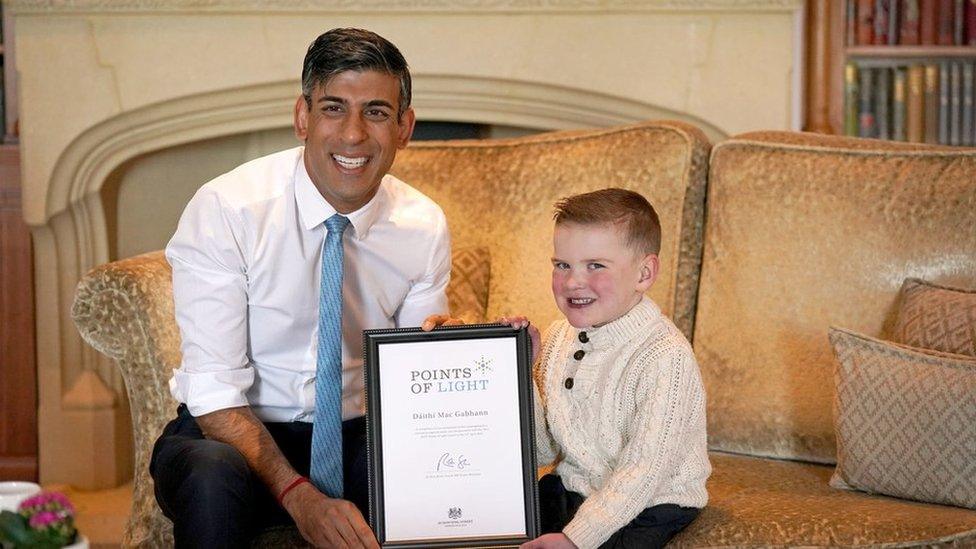DĂĄithĂ's Law: Rishi Sunak honours Belfast boy over organ donation
- Published
- comments

A Points of Light award recognises people who are contributing to their community
Prime Minister Rishi Sunak has presented a six-year-old boy from Belfast with a special award for his campaign to reform organ donation in Northern Ireland.
DĂĄithĂ helped to change the rules so that now every adult will be considered a potential organ donor unless they say in advance that they don't want to.
Organ donation is an issue that is extremely important to DĂĄithĂ, as he has been on the list to get a heart transplant for about five years.
The new law, known as DĂĄithĂ's Law, takes effect from June and is similar to Max and Kiera's Law, which sets out the rules for organ donation in England and Wales.
An organ donor is someone who gives part of their body after they die, such as a kidney, liver or heart, to someone else who needs it.
Thousands of lives in the UK are saved each year by organ transplants.
Mr Sunak met DĂĄithĂ and his family while in Belfast to mark the 25th anniversary of the Good Friday Agreement.
He presented the six-year-old with a Points of Light award, which recognises people who are contributing to their community.
In a tweet, the prime minister said: "One of the joys of my job is being able to meet some exceptional people - just like DĂĄithĂ".
In an earlier letter to DĂĄithĂ, the prime minister said the six-year-old was "helping others in your situation to get the life-changing help they need - it is a huge achievement".
DĂĄithĂ's Law will save lives
He added: "In your father's words: 'Exceptional things happen for exceptional people'. I agree with him that you are truly exceptional and so I am delighted to recognise your courage by naming you as the UK's 2029th Point of Light.
"The whole country is with you as you continue your treatment."
What is DĂĄithĂ's Law?
Northern Ireland is the only part of the UK where an opt-out organ donation system is not in place - but DĂĄithĂ's Law changes this, bringing it into line with the rules in the rest of the UK.
It was introduced in the Stormont assembly in 2021 and passed its final stage in February 2022.
The law had been delayed because the Northern Ireland government has not met for some time, due to a disagreement about some of the rules following Brexit.
But the UK government stepped in to ensure it could take effect.
- Published28 September 2022
- Published20 May 2020
